cunydhi
Wednesday March 20: Anne Balsamo on “Lessons from the AIDS Memorial Quilt Digital Experience Project”
On 13, Mar 2013 | In Meetings | By Charlie Edwards
Please join us on Wednesday March 20, 2013 when we will be delighted to welcome Anne Balsamo, Dean of the School of Media Studies and Professor of Media Studies at The New School for Public Engagement, who will discuss her work with the AIDS Memorial Quilt Digital Experience Project. Details are below – we look forward to seeing you there!
Anne Balsamo (The New School for Public Engagement)
“The Cultural Work of Interactive Memorials: Lessons from the AIDS Memorial Quilt Digital Experience Project”
 Wednesday March 20, 2013, 6:30pm-8:30pm, CUNY Graduate Center, Room 3212
Wednesday March 20, 2013, 6:30pm-8:30pm, CUNY Graduate Center, Room 3212
Please register here
The event is free and open to the public.
“Epidemics, like wars, mark a generation for life.”
The AIDS Memorial Quilt was created 25 years ago as a work of community activism to protest the appalling lack of attention by the US health agencies to what was then, in 1987, an increase in improbable fatalities among previously healthy gay men in the United States. Its first inception unfolded in October 1987 on the National Mall in Washington DC as part of the March for Gay Rights; it included 1,920 Quilt panels. Now 25 years later, the Quilt encompasses more than 48,000 panels, representing 60 countries and commemorating more than 93,000 names. It is the largest living memorial of its kind in the world.
The Quilt is also an “activist archive” of the late 20th century. The activities that gave rise to the Quilt in 1987 are part of the history of the campaign for gay and lesbian rights in the US. The Quilt literally stitches together a million memories, a million stories, a million lessons about the relationship between individual lives, public culture, and political activism. In its textile form, it is an unwieldy archive. If laid out in its entirety the Quilt would cover more than 1.3 million square feet. It weighs more than 34 tons.
This presentation discusses the creation of an interactive memorial that was designed to augment the viewing of the textile Quilt. I will demonstrate three digital experiences: 1) an open-source mobile web application called AIDS QUILT TOUCH; 2) a tangible tabletop interactive that enables viewers to search the database of Quilt images to find a specific image and to browse the archive of Quilt panel images; and 3) a community sourcing application that engages people in analyzing and archiving information about the Quilt.
This effort is framed by my recent transmedia book project called Designing Culture: The Technological Imagination At Work. In creating the Quilt Digital Experiences I was interested in exploring the cultural work of public interactives, to examine how they are implicated in practices of cultural reproduction—remembering, witnessing, archiving, and educating.
About Anne Balsamo:
In her recent book, Designing Culture: The Technological Imagination at Work (Duke, 2011), Anne Balsamo offers a manifesto for rethinking the role of culture in the process of technological innovation in the 20th century. Based on her experiences as an educator, new media designer, research scientist and entrepreneur, the book offers a series of lessons about the cultivation of the technological imagination and the cultural and ethical implications of emergent technologies.
Dr. Balsamo was recently appointed the Dean of the School of Media Studies at the New School for Public Engagement in New York. Previously she was a full professor at the University of Southern California in the Annenberg School of Communication and the Interactive Media Division of the School of Cinematic Arts. From 2004-2007, she served as the Director of the Institute for Multimedia Literacy at USC where she created one of the first academic programs in multimedia literacy across the curriculum. In 2002, she co-founded Onomy Labs, Inc. a Silicon Valley technology design and fabrication company that builds cultural technologies. From 1999-2002, she was a member of RED (Research on Experimental Documents), a collaborative research-design group at Xerox PARC who created experimental reading devices and new media genres. She served as project manager and new media designer for the development of RED’s interactive museum exhibit, XFR: Experiments in the Future of Reading that toured Science/Technology Museums in the U.S. from 2000-2003. Her earlier book, Technologies of the Gendered Body: Reading Cyborg Women (Duke UP, 1996) investigated the social and cultural implications of emergent bio-technologies.
See more about her work at her site, Designing Culture.
Thursday February 28: Mary Flanagan – Opening Keynote for “Minding the Body”
On 25, Feb 2013 | In Meetings | By Charlie Edwards
Please join us this Thursday February 28, 2013 for a special presentation given by Mary Flanagan, Sherman Fairchild Distinguished Professor in Digital Humanities at Dartmouth College, Director of Tiltfactor Laboratory, and artist.
Her presentation is the opening keynote for “Minding the Body: Dualism and its Discontents,” an interdisciplinary conference hosted by the English Student Association at CUNY Graduate Center. It is also the inaugural event of our Spring 2013 speaker series, kindly sponsored by the GC Digital Initiatives Program (full schedule coming soon).
Mary Flanagan (Dartmouth College)
“Never Mind the Body, Here’s a Gamepad? Considering Embodiment in The Age of Play“
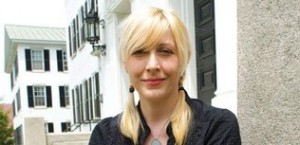 Sponsored by the English Student Association, Doctoral Students’ Council, GC Digital Initiatives, the Center for Humanities, and CUNY Digital Humanities Initiative
Sponsored by the English Student Association, Doctoral Students’ Council, GC Digital Initiatives, the Center for Humanities, and CUNY Digital Humanities Initiative
Thursday, February 28, 2013, 4:00 p.m. – 5:30 p.m.
C204-C205, CUNY Graduate Center
This keynote presentation explores a pervasive onscreen/offscreen split of identification and the body in what we could now call The Age of Play. Citing examples from artists’ work and popular culture, with a focus on games, Flanagan leads the audience on an investigation of current trends that are in diametrical opposition: on the one hand, a hunger for embodied, resonant experience; and on the other, a desire for control for the body, a recurring motif in fields from psychology to public health, manifesting in plastic surgery and digital manipulation of the body.
The presentation is free and open to the public and will also be available as a live streaming video (link will be available shortly before the presentation on Thursday, Feb. 28).
About “Minding the Body”:
“Minding the Body: Dualism and its Discontents” is an interdisciplinary conference hosted by the English Student Association at The CUNY Graduate Center. The conference presents work by 65 presenters that explore the “mind-body problem” via a range of disciplines, including literary studies, philosophy, medicine, psychology, sociology, film and media studies, the visual arts, performance studies, and cognitive science, among others. See the conference website for more details.
About Mary Flanagan:
Mary Flanagan is an innovator focused on how people create and use technology. Her groundbreaking explorations across the arts, humanities, and sciences represent a novel use of methods and tools that bind research with introspective cultural production. As an artist, her collection of works range from game-inspired systems to computer viruses, embodied interfaces to interactive texts. These works are exhibited internationally at venues including the Laboral Art Center, The Whitney Museum of American Art, SIGGRAPH, Beall Center, The Banff Centre, The Moving Image Center, Steirischer Herbst, Ars Electronica, Artist’s Space, The Guggenheim Museum New York, Incheon Digital Arts Festival South Korea, Writing Machine Collective Hong Kong, Maryland Institute College of Art, and venues in Brazil, France, UK, Canada, Taiwan, New Zealand, and Australia.
As a researcher, she focuses on popular culture, digital studies, and computer games to look at issues of representation, behavior, equity, and process. She writes about popular culture and digital media such as computer games, virtual agents, and online spaces in order to understand how they affect and reflect culture. In the field of creative writing, Flanagan is known as a writer of electronic literature, and she is also a poet, with work in The Iowa Review, Barrow Street, Saranac Review, Mudfish, and other books & periodicals. She has written more than twenty critical essays on digital art, cyberculture, and gaming in periodicals such as Art Journal, Wide Angle, Intelligent Agent, Convergence, and Culture Machine, as well as several books. Her books in English include reload: rethinking women + cyberculture (2002), re:SKIN (2007), and Critical Play: Radical Game Design (2009), all with MIT Press. She is also co-author with Matteo Bittanti of Similitudini. Simboli. Simulacri, on the game The Sims (in Italian, Unicopli 2003). She is author, with Helen Nissenbaum, of the forthcoming Values at Play (MIT Press, 2013).
Flanagan founded the Tiltfactor game research laboratory in 2003, where researchers study and make social games, urban games, and software in a rigorous theory/practice environment. She is the Sherman Fairchild Distinguished Professor in Digital Humanities at Dartmouth College.
Website: http://www.maryflanagan.com/(includes extensive images and video). Mary Flanagan also writes on Grand Text Auto. See also Values at Play.
May 31: Archiving Catastrophe – Digital Humanities & Times of Disaster
On 25, May 2012 | In Meetings | By Charlie Edwards
Please join us on Thursday, May 31, 2012, when three leading Digital Humanists will take part in a panel discussion that addresses DH-related efforts to archive and preserve materials after catastrophic events.
Thursday, May 31, 2012, 6:30pm-8:30pm
Room 6496, CUNY Graduate Center
Archiving Catastrophe: Digital Humanities & Times of Disaster
Paul Millar (University of Canterbury, New Zealand), Tom Scheinfeldt (George Mason University), and Steve Brier (CUNY Graduate Center)
In the months since a 7.1 magnitude earthquake hit New Zealand’s Canterbury province in September 2010, the region has experienced over ten thousand aftershocks, 430 above magnitude 4.0. The most devastating aftershock, a 6.2 earthquake under the centre of Christchurch on 22 February 2011, had one of the highest peak ground acceleration rates ever recorded. This event claimed 185 lives, damaged 80% of the central city beyond repair, and forced the abandonment of 6,000 homes. It is the third costliest insurance event in history. Paul Millar, project leader of the CEISMIC Canterbury Earthquakes Digital Archive, will discuss the role of Digital Humanities in developing an international resource to preserve the digital record of the earthquakes’ impacts and the long-term process of recovery.
The Hurricane Digital Memory Bank, based at the Roy Rosenzweig Center for History and New Media (RRCHNM) at George Mason University, uses electronic media to collect, preserve, and present the stories and digital record of Hurricanes Katrina, Rita, and Wilma. The project contributes to the ongoing effort by historians and archivists to preserve the record of these storms by collecting first-hand accounts, on-scene images, blog postings, and podcasts. Tom Scheinfeldt, Managing Director of RRCHNM, will discuss both this project and, with CUNY Grad Center’s Steve Brier, the September 11 Digital Archive.
The September 11 Digital Archive uses electronic media to collect, preserve, and present the history of the September 11, 2001 attacks in New York, Virginia, and Pennsylvania and the public responses to them. Funded by a major grant from the Alfred P. Sloan Foundation and organized by the American Social History Project at the Graduate Center and at RRCHNM, the work of the Archive is not only to gather digital materials related to the attacks but also to assess how history is being recorded and preserved in the twenty-first century, and to develop free software tools to help historians do a better job of collecting, preserving, and writing history. To these ends the Archive has partnered with the Library of Congress, which in September 2003 accepted the Archive into its permanent collections – an event that both ensured the Archive’s long-term preservation and marked the Library’s first major digital acquisition.
All three projects seek to foster positive legacies of terrible events by allowing the people affected to tell their stories in their own words, which as part of the historical record will remain accessible to a wide audience for generations to come.
About Paul Millar:
Associate Professor Paul Millar is the Head of the Department of English, Cinema and Digital Humanities at the University of Canterbury, New Zealand. His research interests include New Zealand and Pacific literature, literary biography, digital textual scholarship and Australasian attitudes to China. In 2001 he co-founded the New Zealand Electronic Text Centre, and he is currently focused on adding functionality to the CEISMIC Canterbury Earthquakes federated digital archive.
About Tom Scheinfeldt:
Tom Scheinfeldt is Managing Director of the Roy Rosenzweig Center for History and New Media and Research Assistant Professor of History in the Department of History and Art History at George Mason University. He has lectured and written extensively on the history of popular science, the history of museums, history and new media, and the changing role of history in society, and has worked on traditional exhibitions and digital projects at the Colorado Historical Society, the Museum of the History of Science in Oxford, The Louisiana State Museum, the National Museum of American History, and the Library of Congress. In addition to managing general operations at RRCHNM, Scheinfeldt directs several of its online history projects, including Omeka, THATCamp, One Week | One Tool, the September 11 Digital Archive, the Hurricane Digital Memory Bank, the Papers of the War Department, 1784-1800, and Gulag: Many Days, Many Lives. He gave a memorable talk here at CUNY DHI in December 2010.
About Steve Brier:
Dr. Stephen Brier founded the Interactive Technology and Pedagogy Certificate Program at The Graduate Center in 2002 and serves as its Coordinator. He is a historian and a member of the doctoral faculty in Urban Education who has published widely in text, video, and various forms of multimedia on issues from U.S. history to the uses of interactive technology to improve teaching and learning. He was the founding director of The Graduate Center’s American Social History Project/Center for Media and Learning and was the executive producer of the award-winning “Who Built America?” multimedia curriculum, including textbooks, videos, and CD-ROMs. He has co-produced other award-winning websites, including “History Matters” and the “September 11 Digital Archive”. Brier, who previously served for eleven years as a senior administrator at The Graduate Center, is also the institution’s Senior Academic Technology Officer and the co-director of its New Media Lab.
May 8: Ramona Hernández and Anthony Stevens-Acevedo on the Spanish Paleography Digital Teaching and Learning Tool
On 03, May 2012 | In Meetings | By Charlie Edwards
Please join us on Tuesday, May 8, 2012 when the leaders of the Spanish Paleography Digital Teaching and Learning Tool project, funded by a Digital Humanities Start-Up Grant awarded by the NEH’s Office of Digital Humanities, will visit CUNY DHI to discuss their work to date. The project aims to teach users the paleographic skills required to decode early-modern Spanish manuscripts.
Tuesday, May 8, 2012, 6:30pm-8:30pm
Room 6496, CUNY Graduate Center
The Spanish Paleography Digital Teaching and Learning Tool
Ramona Hernández and Anthony Stevens-Acevedo, CUNY Dominican Studies Institute, City College
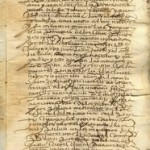
The Spanish Paleography Digital Teaching and Learning Tool aims to teach users how to decode and read the now abstruse three main handwriting styles in fashion in the early modern Spanish-language world. At the heart of the project is the creation of a website prototype where visitors will be able to consult, on the same screen, different samples of early-modern Spanish handwritings and line-by-line transcriptions into contemporary typeface. By a basic process of repeated visual comparison, the users learn how to decipher or decode the early-modern Spanish manuscripts – a learning that still today, for the most part, is restricted to very specialized university, archives and library settings. Allowing Internet users worldwide to access this learning at any time will hopefully entice more students and scholars in the Humanities to conduct research on the early-modern Spanish world, while democratizing access to the paleographic skills involved.
About Ramona Hernández:
Dr. Ramona Hernández is director of the Dominican Studies Institute of the City University of New York (CUNY) housed at The City College of New York, and is Professor of Sociology at City College and on the faculty of the Graduate Center, CUNY. She serves as a trustee of the International Institute of Advanced Studies in the Social Sciences (Instituto Global de Altos Estudios en Ciencias Sociales) of the Dominican Republic. Dr. Hernández earned the Ph.D. and M.Phil. in Sociology from the Graduate Center, CUNY; an M.A. in Latin American and Caribbean Studies from New York University; and the B.A. in Latin American History from Lehman College. She is also author of pioneering texts in the areas of migration, labor, and Dominican studies, including The Mobility of Workers Under Advanced Capitalism: Dominican Migration to the United States (named Outstanding Academic Title by Choice, 2002) and, as co-author, The Dominican Americans (1998). She is a trustee of the Sociological Initiatives Foundation.
About Anthony Stevens-Acevedo:
Anthony Stevens-Acevedo is assistant director and founding member of the Dominican Studies Institute of the City University of New York (CUNY DSI) at The City College of New York. He is a founding member of the Council of Dominican Educators, the Dominican Studies Association, and a Foreign Corresponding Member of the Dominican Academy of History (Dominican Republic). Stevens-Acevedo is a historian and focuses his research on the early colonial history of the Dominican Republic. He is the lead investigator in CUNY DSI’s Dominican colonial research projects. He has an M.A. in History from The City College of New York, CUNY, and a B.A. in History of the Americas from the University of Seville, Spain. He is currently a student in the History Program at the CUNY Graduate Center.
Dr. Hernández and Stevens-Acevedo have recently co-authored the chapter ‘Dominican Americans’ for ‘Multicultural America: An Encyclopedia of the Newest Americans,’ Ronald H. Baylor, editor, 2011. In 2011 they co-edited a special issue on Dominicans in the United States of “Camino Real,” the Journal of Instituto Franklin of the University of Alcalá, Spain, devoted to the Hispanic world in the United States.
May 1: Doug Reside (NYPL) on the Digital Creative Process of Jonathan Larson’s RENT
On 26, Apr 2012 | In Meetings | By Charlie Edwards
Please join us on Tuesday, May 1, 2012 when we will be delighted to host Doug Reside of the New York Public Library.
“How do you document real life?: Discovering the Digital Creative Process of Jonathan Larson’s RENT”
Doug Reside, New York Public Library
Tuesday, May 1, 2012, 6:30pm-8:30pm
Room 6496, CUNY Graduate Center

Doug Reside will discuss his attempts to reconstruct the creative process that produced the musical RENT by recovering and studying the digital drafts from Jonathan Larson’s original floppy disks. Reside will also offer some reflections on his newly minted position as Digital Curator of the Performing Arts at New York Public Library and will suggest strategies libraries may employ for dealing with the coming onslaught of born digital research collections.
About Doug Reside:
Doug Reside became the first Digital Curator of the Performing Arts at New York Public Library in February of 2011 after serving for four and a half years on the directorial staff of the Maryland Institute for Technology in the Humanities (MITH) at the University of Maryland in College Park. He has led numerous Digital Humanities projects and is currently editing the Musical of the Month blog at NYPL which makes available one musical theater libretto each month in various ebook formats.
Spring 2012 CUNY Digital Studies/Digital Humanities Seminar Schedule
On 26, Apr 2012 | In Meetings | By Charlie Edwards
We are delighted to announce (though belatedly!) our full schedule of events for Spring 2012, sponsored by the Center for the Humanities at the CUNY Graduate Center. We have three exciting presentations still to come in May and very much hope you will be able to join us.
All events are free and open to the public, and take place at the CUNY Graduate Center.
Friday, February 17, 4pm-6pm: “Debates in the Digital Humanities: A Panel Discussion”
Chair: Matthew K. Gold and Panelists: Stephen Brier, Charlie Edwards & David Greetham
Room 4406, CUNY Graduate Center
Sponsored by the Ph.D. Program in English
The semester began with a panel discussion kindly hosted by CUNY Graduate Center’s English PhD Program as part of the program’s “Friday Forum” series. The topic was Debates in the Digital Humanities, recently published by the University of Minnesota Press, and edited by our own Matthew K. Gold.
Monday, April 2, 6:30pm-8:30pm: “Risking Failure by Playing Around with Digital Pedagogy”
Katherine D. Harris (San José State University)
Room 6417, CUNY Graduate Center
For our second event of the semester, we welcomed CUNY alum Katherine D. Harris to speak on DH in the undergraduate classroom. Her talk focused on her experiences with a student-driven project that is run outside the institutional boundaries of a traditional English Department curriculum and the risks, failures, and disappointments that are inherent in adopting a collaborative and playful learning environment.
Tuesday, May 1, 6:30pm-8:30pm: “How do you document real life?: Discovering the Digital Creative Process of Jonathan Larson’s RENT”
Doug Reside, New York Public Library
Room 6496, CUNY Graduate Center
Doug Reside will discuss his attempts to reconstruct the creative process that produced the musical RENT by recovering and studying the digital drafts from Jonathan Larson’s original floppy disks. Reside will also offer some reflections on his newly minted position as Digital Curator of the Performing Arts at New York Public Library and will suggest strategies libraries may employ for dealing with the coming onslaught of born digital research collections.
Tuesday, May 8, 6:30pm-8:30pm: “Digital Paleography at CUNY: The Spanish Paleography Digital Teaching and Learning Tool”
Ramona Hernández and Anthony Stevens-Acevedo, CUNY Dominican Studies Institute, City College
Room 6496, CUNY Graduate Center
The leaders of the Spanish Paleography Digital Teaching and Learning Tool project, funded by a Digital Humanities Start-Up Grant awarded by the NEH’s Office of Digital Humanities, will join us to discuss their work to date. The project aims to teach users the paleographic skills required to decode early-modern Spanish manuscripts.
Thursday, May 31, 6:30pm-8:30pm: “Digital Humanities and Natural Disasters: Archiving Catastrophe”
Paul Millar (University of Canterbury, New Zealand), Tom Scheinfeldt (George Mason University), and Steve Brier (CUNY Graduate Center)
Room 6496, CUNY Graduate Center
Three leading Digital Humanists will join us in a panel discussion that addresses DH-related efforts to archive and preserve materials after catastrophic events. They will discuss the CEISMIC Canterbury Earthquakes Digital Archive, the Hurricane Digital Memory Bank, and the September 11 Digital Archive. All three projects seek not only to preserve the digital record of the events, but to foster positive legacies by allowing the people affected to tell their stories in their own words, which as part of the historical record will remain accessible to a wide audience for generations to come.
Oct 18: DH in the Classroom: Shannon Mattern & Mark Sample
On 13, Oct 2011 | In Meetings | By Charlie Edwards
Please join us on Tuesday October 18, 2011, when we are excited to welcome two innovative practitioners of “Digital Humanities in the Classroom” – The New School’s Shannon Mattern, and Mark Sample, of George Mason University.
Details are below; we look forward to seeing you there!
Time & Place: Tuesday October 18, 2011, 6:30-8:30pm, Room 6496, CUNY Graduate Center
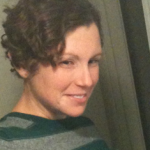 Shannon Mattern, “Beyond the Seminar Paper: Setting New Standards for New Forms of Student Work”
Shannon Mattern, “Beyond the Seminar Paper: Setting New Standards for New Forms of Student Work”
By exploring how new technologies might function as teaching tools or platforms on which students can demonstrate their learning, we expand the means and ends of education. With this increasing openness of pedagogical forms comes the responsibility to justify our choices and develop new forms of criticism and modes of assessment. Using several of my own courses as examples, I’ll address the challenges and potential benefits of holding students, and ourselves, accountable for the choices we make in our classrooms and advising relationships. I’ll focus on the value of (1) student documentation of their learning process, and in particular (2) students’ justification of their chosen methods and modes of presentation; (3) collaborative development of criteria for evaluation; and (4) connecting our work in the classroom to larger public problems and public institutions.
Suggested readings:
- Shannon Mattern, “Trying to Wrap My Head Around the Digital Humanities, Part 2” Words in Space (June 23, 2010)
- Shannon Mattern, “Evaluating Multimodal Student Work” Words in Space (August 11, 2010)
- Steve Anderson, “Regeneration: Multimedia Genres and Emerging Scholarship” Institute for Multimedia Literacy (June 29, 2008)
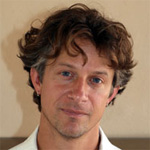 Mark Sample, “Building and Sharing When You’re Supposed to be Teaching”
Mark Sample, “Building and Sharing When You’re Supposed to be Teaching”
My pedagogy can increasingly be summed up in five words: “Make things. And share them.” I will talk briefly about my move toward assignments and projects in the undergraduate humanities classroom that emphasize making—as opposed to simply writing. I will also address the sharing aspect of these projects, which I see as a critical intervention into the enclosured experience most students have in higher education.
Suggested readings:
- “Student Contracts for Digital Projects” by Jeffrey McClurken
- “Integrating a Digital Project Into a Class: Deciding on a Project” by Amy Cavender
- “Using a Graphic Illustrator in Higher Education: Comic Life” by Billie Hara
Shannon Mattern is an Assistant Professor of Media Studies and Film at The New School and was, from 2006 to 2009, director of the Masters in Media Studies program. Her research and teaching focus on relationships among media, architectural, and urban space. Her book, The New Downtown Library, was supported by the Graham and Mellon foundations and published by the University of Minnesota Press in 2007. She has also published in several edited volumes and in journals including Space and Culture, Public Culture, and the Journal of Architectural Education. Her classes, which regularly involve the use of digital media, have resulted in the creation of exhibitions and installations and, in Fall 2010, thanks to the support of an Innovations in Education grant from The New School, a prototype of an open-source mapping tool for scholarly urban research. She is a recipient of The New School’s 2011 Distinguished University Teaching Award.
Mark Sample is an Assistant Professor in the Department of English at George Mason University, where is he also an affiliated faculty member with GMU’s undergraduate Honors College, its Cultural Studies doctoral program, and the Center for History and New Media. His research focuses on contemporary fiction, electronic literature, and videogames. His examination of the representation of torture in videogames was recently published in Game Studies, and he is working on a collaboratively written book about the Commodore 64 home computer. Mark has work in Hacking the Academy, a crowdsourced scholarly book forthcoming in print by the digitalculturebooks imprint of the University of Michigan Press. Mark has recently remixed the entire text of Hacking the Academy as Hacking the Accident. Mark is also an outspoken advocate of open source pedagogy and open source research. In recognition of his commitment to innovation in teaching, he was the recipient of George Mason’s 2010 Teaching Excellence Award. He is a regular contributor to ProfHacker, a feature at the Chronicle for Higher Education that focuses on pedagogy and scholarly productivity, and he also writes for Play the Past, a collaboratively edited scholarly blog that explores the intersection of cultural heritage and games.
This event is co-sponsored by The CUNY Digital Humanities Initiative and the CUNY Digital Studies Group, in partnership with The Center for the Humanities at The Graduate Center, CUNY.
Digital Humanities Syllabi
On 06, Jun 2011 | In Resources | By Matthew K. Gold
Do you teach a digital humanities course? Let us know by leaving a comment on this post. We’ll add it to the DH Syllabi page of the CUNY Digital Humanities Resource Guide, which is published on the wiki of the CUNY Academic Commons. I’ve embedded the DH Syllabi wiki page below.
DH Syllabi
301 Moved Permanently
May 4: Douglas Armato on “Digital Media’s Prehistory and the Nine Lives of Scholarly Publishing”
On 29, Apr 2011 | In Meetings | By Charlie Edwards
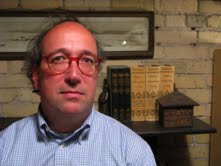 Please join us on Wednesday, May 4, 2011, when we are excited to welcome Douglas Armato, Director of the University of Minnesota Press and Editor of its Digital Culture Studies List, to speak on “Digital Media’s Prehistory and the Nine Lives of Scholarly Publishing.”
Please join us on Wednesday, May 4, 2011, when we are excited to welcome Douglas Armato, Director of the University of Minnesota Press and Editor of its Digital Culture Studies List, to speak on “Digital Media’s Prehistory and the Nine Lives of Scholarly Publishing.”
Scholarly publishing has survived through adaptation and economic reinvention and now faces new challenges, and opportunities, as the market for ebooks reaches escape velocity and the emergence of the digital humanities reconfigures academic work. Doug’s talk will discuss how university presses are adapting both individually and collectively to the digital environment and how presses remain a vital counterforce to the diminished status of of the humanities in higher education.
This will our last public event of the semester – we very much hope you can attend. We would also like to take the opportunity to thank all of you who have participated in CUNY DHI, online or in person, and helped to make the group’s first year such a success. We look forward to next year’s activities!
Doug’s talk is co-sponsored by The CUNY Digital Humanities Initiative and the CUNY Digital Studies Group, in partnership with The Center for the Humanities at The Graduate Center, CUNY.
Time & Place: Wednesday, May 4, 2011, 6:30-8:30pm, Room C201/202, CUNY Graduate Center
March 30: Kathleen Fitzpatrick on “Peer Review, Open Scholarship, and the Digital Humanities”
On 25, Mar 2011 | In Meetings | By Charlie Edwards
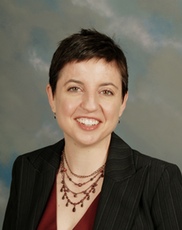 We are delighted that on Wednesday, March 30 we will be hosting Kathleen Fitzpatrick of Pomona College, who will speak on “Peer Review, Open Scholarship, and the Digital Humanities.”
We are delighted that on Wednesday, March 30 we will be hosting Kathleen Fitzpatrick of Pomona College, who will speak on “Peer Review, Open Scholarship, and the Digital Humanities.”
Peer review is the sine qua non of the academy: we use it in nearly everything we do, and cannot imagine what scholarship would be without it. But for such a crucial component of the ways that we work, none of us are wholly satisfied with it, either. Moreover, conventional forms of peer review are often misaligned with the kinds of open scholarship being produced in the digital humanities. This talk takes a brief look at the history and the present criticism of peer review as a means of exploring its future, particularly as scholarly publishing moves increasingly online: what might peer review that took advantage of the reputation economies developed within networked communities look like, and how might it help scholarly communication flourish?
Kathleen Fitzpatrick is Professor of Media Studies at Pomona College. She is author of The Anxiety of Obsolescence: The American Novel in the Age of Television (2006) and Planned Obsolescence: Publishing, Technology, and the Future of the Academy, forthcoming from NYU Press. Planned Obsolescence was published using an experimental open peer review process by MediaCommons Press, a project of the digital scholarly network MediaCommons, co-founded by Kathleen. She has published in journals including the Journal of Electronic Publishing, PMLA, Contemporary Literature, and Cinema Journal, and has blogged at Planned Obsolescence since 2002.
Kathleen’s talk is co-sponsored by The CUNY Digital Humanities Initiative and the CUNY Digital Studies Group, in partnership with The Center for the Humanities at The Graduate Center, CUNY.
Time & Place: Wednesday, March 30, 2011, 6:30-8:30pm, Room 6417, CUNY Graduate Center

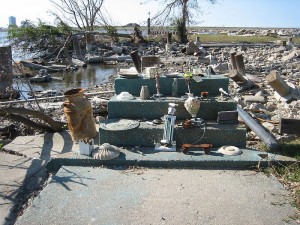
 Welcome to the blog of the CUNY DHI, an effort to build momentum and community around Digital Humanities practitioners at CUNY. We hope you'll join us at our upcoming events and that you'll follow this blog to hear about the latest news in the field.
Welcome to the blog of the CUNY DHI, an effort to build momentum and community around Digital Humanities practitioners at CUNY. We hope you'll join us at our upcoming events and that you'll follow this blog to hear about the latest news in the field.



Recent Comments